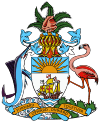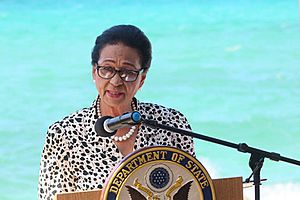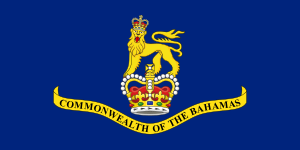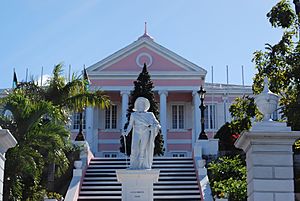Governor-General of the Bahamas facts for kids
Quick facts for kids Governor-General of The Bahamas |
|
|---|---|

|
|

|
|
| Viceroy | |
| Style |
|
| Residence | Government House, Nassau |
| Appointer | Monarch of The Bahamas
on the advice of the prime minister
|
| Term length | At His Majesty's pleasure |
| Constituting instrument | Constitution of The Bahamas |
| Formation | 10 July 1973 |
| First holder | Sir John Paul |
| Deputy | Ruby Ann Darling |
| Salary | 37,000 BSD annually |
The governor-general of The Bahamas is a very important person in the country. They act as the representative of the Bahamian monarch, who is currently King Charles III. The King appoints the governor-general. This appointment happens after the prime minister of The Bahamas suggests a person for the role.
The governor-general has many duties. These include choosing ministers, judges, and ambassadors. They also approve new legislation (laws) passed by parliament. Another key role is to announce when new elections will happen.
Generally, the governor-general follows a system called the Westminster system. This means they stay politically neutral. They must always act based on the advice of the prime minister. The governor-general also has a special role in ceremonies. They host events at their official home, Government House, in Nassau. They also give awards to people and groups who help The Bahamas and their communities. When the governor-general travels, they represent The Bahamas and its King. A team of staff helps the governor-general with their duties.
Governors-general serve for as long as the monarch wishes. Since September 1, 2023, Dame Cynthia A. Pratt has been the governor-general. The position of governor-general began on July 10, 1973. This was when The Bahamas became an independent country from the United Kingdom. Since then, 12 people have held this important office.
Contents
Becoming Governor-General
The monarch of The Bahamas officially appoints the governor-general. When a new governor-general is needed, the prime minister suggests a name to the monarch. The monarch usually agrees with this suggestion. During the special ceremony where they start their job, the new governor-general takes two important promises. They promise to be loyal and to do their job well. The chief justice of The Bahamas leads these promises.
The promise for doing the job of governor-general is:
"I, (name), do swear that I will well and truly serve His Majesty King Charles III in the office of Governor-General. So help me God."
What the Governor-General Does
The Bahamas shares its monarch with 14 other countries in the Commonwealth of Nations. Since the King lives mostly outside The Bahamas, the governor-general's main job is to do the King's duties for him. So, the governor-general carries out their tasks in the government of The Bahamas on behalf of the King.
The Bahamian constitution explains the governor-general's powers and duties. These are found in Sections 32 to 37 of the constitution.
Role in Government
The governor-general is in charge of ending parliament sessions. They also announce when new elections will take place. After an election, the governor-general officially asks the leader of the winning political party to form a government. The governor-general then formally appoints the prime minister and other ministers.
The governor-general also gives royal assent to laws. This means they officially approve laws passed by the Parliament of The Bahamas.
The governor-general acts on the prime minister's advice. They issue rules and announcements under existing laws. They also appoint state judges, ambassadors to other countries, and other senior government officials.
The governor-general can also start special investigations called Royal Commissions of Inquiry. They approve many other government decisions made by ministers, like agreeing to treaties with foreign countries.
Sometimes, the governor-general can make decisions without or against the prime minister's advice. These are called "reserve powers." They include:
- Choosing a prime minister if no party clearly wins an election.
- Removing a prime minister who has lost the support of parliament.
- Removing any minister who is breaking the law.
- Refusing to end the House of Representatives, even if the prime minister asks.
Ceremonial Duties
The governor-general has many ceremonial duties. They open new parliament sessions by giving a special speech. They welcome leaders from other countries. They also receive official documents from foreign diplomats.
The governor-general also gives awards to Bahamians. These awards are for great service to the community or for brave actions.
Community Involvement
The governor-general provides leadership in the community without taking sides in politics. They support many charities, sports groups, and cultural organizations. They attend events all over the country.
The governor-general also helps bring Bahamians together. In this role, they:
- Often welcome Bahamians to Government House for special events.
- Meet students from different schools and visitors from other countries.
- Attend church services and other religious events.
- Go to charity, social, and community events.
- Become a patron (supporter) of many national, cultural, and professional groups.
- Send congratulatory messages for special anniversaries and events. These include big conferences, festivals, and sports championships.
Special Privileges
In 2016, The Bahamas created seven national awards. The governor-general is the head of all these awards.
Salary
The governor-general receives a yearly salary of 75,000 BSD.
Symbols of Office
The governor-general has their own special flag. It shows a lion and a royal crown on a blue background. Below them, it says "Commonwealth of The Bahamas." This flag is flown on buildings and other places in The Bahamas when the governor-general is present.
Official Home
Government House in Nassau is where the governor-general of The Bahamas lives and works. It was built between 1803 and 1806. It has been the official home and office for all Bahamian governors-general since the country became independent in 1973.
Past Governors-General
Here is a list of the people who have served as governor-general of The Bahamas since 1973.
Symbols
- Died in office.
Denotes acting governors-general
| No. | Portrait | Name (Birth–Death) |
Term of office | Monarch (Reign) |
||
|---|---|---|---|---|---|---|
| Took office | Left office | Time in office | ||||
| 1 |  |
Sir John Paul (1916–2004) |
10 July 1973 |
31 July 1973 |
21 days |  Elizabeth II  (1973–2022) |
| 2 |  |
Sir Milo Butler (1906–1979) |
1 August 1973 |
22 January 1979 |
5 years, 174 days | |
| – |  |
Doris Sands Johnson (1921–1983) Acting Governor-General |
22 January 1979 |
22 January 1979 |
0 days | |
| – |  |
Sir Gerald Cash (1917–2003) Acting Governor-General |
22 January 1979 |
23 September 1979 |
244 days | |
| 3 |  |
Sir Gerald Cash (1917–2003) |
23 September 1979 |
25 June 1988 |
8 years, 276 days | |
| – |  |
Sir Henry Milton Taylor (1903–1994) Acting Governor-General |
26 June 1988 |
28 February 1991 |
2 years, 247 days | |
| 4 |  |
Sir Henry Milton Taylor (1903–1994) |
28 February 1991 |
1 January 1992 |
307 days | |
| 5 |  |
Sir Clifford Darling (1922–2011) |
2 January 1992 |
2 January 1995 |
3 years, 0 days | |
| 6 |  |
Sir Orville Turnquest (b. 1929) |
3 January 1995 |
13 November 2001 |
6 years, 314 days | |
| – |  |
Dame Ivy Dumont (b. 1930) Acting Governor-General |
13 November 2001 |
1 January 2002 |
49 days | |
| 7 |  |
Dame Ivy Dumont (b. 1930) |
1 January 2002 |
30 November 2005 |
3 years, 333 days | |
| – |  |
Paul Adderley (1928–2012) Acting Governor-General |
1 December 2005 |
1 February 2006 |
62 days | |
| 8 |  |
Arthur Dion Hanna (1928–2021) |
1 February 2006 |
14 April 2010 |
4 years, 72 days | |
| 9 |  |
Sir Arthur Foulkes (b. 1928) |
14 April 2010 |
8 July 2014 |
4 years, 85 days | |
| 10 |  |
Dame Marguerite Pindling (b. 1932) |
8 July 2014 |
28 June 2019 |
4 years, 355 days | |
| 11 |  |
Sir Cornelius A. Smith (b. 1937) |
28 June 2019 |
31 August 2023 |
4 years, 65 days | |
 Charles III  (2022–present) |
||||||
| 12 |  |
Dame Cynthia A. Pratt (b. 1945) |
1 September 2023 |
Incumbent | 2 years, 184 days | |
See also
 In Spanish: Gobernador general de las Bahamas para niños
In Spanish: Gobernador general de las Bahamas para niños




